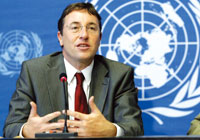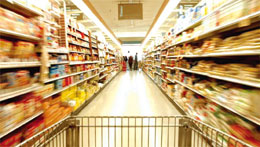 A major new report by the United Nations Environment Programme’s (UNEP) International Panel for Sustainable Resource Management calls for a radical change in the way that economies look at resources, especially when it comes to their effects on the environmental. A major new report by the United Nations Environment Programme’s (UNEP) International Panel for Sustainable Resource Management calls for a radical change in the way that economies look at resources, especially when it comes to their effects on the environmental.
The report entitled “Assessing the Environmental Impacts of Consumption and Production: Priority Products and Materials” was launched in June 2010 by both the UNEP and the European Commission. As outlined by UNEP Executive Director Achim Steiner, it states that the two leading causes of environmental pressures are energy and agriculture:
“Two broad areas are currently having a disproportionately high impact on people and the planet’s life support systems—these are energy in the form of fossil fuels and agriculture, especially the raising of livestock for meat and dairy products.”
The report identifies agriculture and related food consumption
as one of the most important drivers of environmental pressures
affecting habitat and climate change, water use and toxic emissions.
It also explains that the growing global population and developing
economies will cause impacts to be even more accelerated unless
patterns of production and consumption were to change, especially
starting at home with people’s everyday choices. Specifically
highlighted is that an unsustainably large proportion of the
world’s crops are fed to animals, with the report also
stating that agriculture, particularly meat and dairy production,
accounts for 70% of global freshwater consumption, 38% of total
land use and 19% of the world’s greenhouse gas emissions.
Last year, the UN’s Food and Agriculture Organization (FAO) said that food production would have to increase globally 70% by 2050 in order to feed the world’s growing population. However, the UNEP now states in this new report that the current agriculture industry would be overwhelmed by population growth and that diets rich in meat and dairy products are unsustainable:
“Impacts from agriculture are expected to increase substantially due to population growth increasing consumption of animal products. Unlike fossil fuels, it is difficult to look for alternatives: people have to eat. A substantial reduction of impacts would only be possible with a substantial worldwide diet change, away from animal products.”
One suggested solution to steer people away from animal flesh is to place a tax on meat that reflects its effect on the environmental. European Environment Commissioner Janez Potočnik, said that he believes this is the direction the UNEP should be heading:
 “About the consumption of meat . . . I certainly believe that we would need some tax reform . . . I think that’s the direction in which we should go . . . certainly, the thoughts of limiting meat consumption should be taken seriously!” “About the consumption of meat . . . I certainly believe that we would need some tax reform . . . I think that’s the direction in which we should go . . . certainly, the thoughts of limiting meat consumption should be taken seriously!”
The report, which will be presented to world governments, urges policy makers to adopt strict but creative measures to avoid adverse consequences.
Bravo UNEP International Panel for Sustainable Resource
Management, European Commission and all scientists involved
in producing and supporting this forward-thinking report. We
pray that all governments worldwide take quick and decisive
steps to create a sustainable planet that can be enjoyed by
all. 
To watch Supreme Master Television’s program, United Nations Environment Programme Report: Worldwide Diet Change Is Necessary, please visit: http://video.godsdirectcontact.net/magazine/EE1405.php
References:
http://www.guardian.co.uk/environment/2010/jun/02/un-report-meat-free-diet
http://www.unep.org/resourcepanel/documents/pdf/PriorityProductsAndMaterials_Report_Full.pdf
http://www.youtube.com/watch?v=tQlekfaPyaA |

 UN
Urges Move to Vegan Diet
UN
Urges Move to Vegan Diet
 UN
Urges Move to Vegan Diet
UN
Urges Move to Vegan Diet